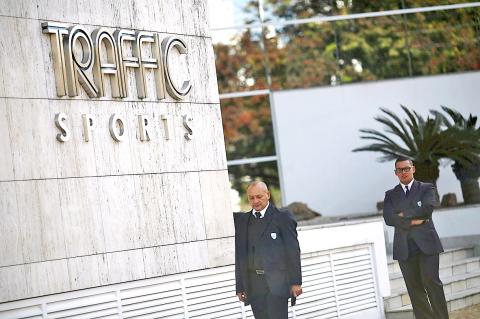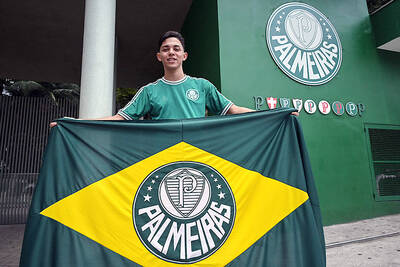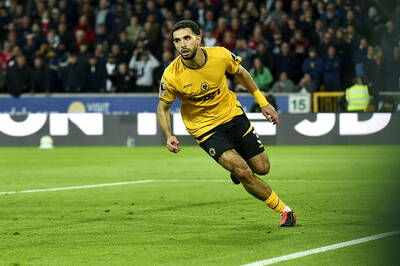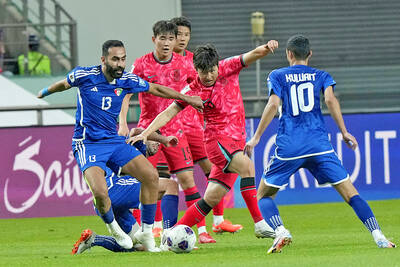Jose Hawilla’s power over Brazilian soccer seemed unbeatable, with O Globo, Rio de Janeiro’s largest newspaper, dubbing him the “owner of Brazilian soccer.”
For decades, he reaped profits through his marketing firm Traffic Group by brokering broadcasting agreements for Latin America’s biggest tournaments and sponsorship deals between Brazil’s national team and companies such as Nike and Coca-Cola. He also took a cut of earnings made by young players he groomed in Brazil who went to play in Europe, and owned soccer teams on three continents.
“It’s no secret that the buying and selling of media rights for tournaments is where the most money changes hands,” said Davi Bertoncello, president of Hello Group, which does market research intelligence and sports marketing. “Hawilla was owner of the company that had the transmission rights for the biggest tournaments, which is why he was one of the most important personalities in the sport.”

Photo: Reuters
Now the 71-year-old Hawilla is a main character in the FIFA scandal involving 14 top global soccer officials and executives. He has detailed to US prosecutors how he was at the center of more than US$100 million in bribes to secure commercial rights, and agreed to forfeit US$151 million. He will also have to sell Traffic, according to court documents.
BEATING PELE
Hawilla, the son of dairy plant owners from Sao Paulo State, started his empire with 30 hot-dog carts. He built that business after being suspended from his job as a sports reporter for Brazilian network TV Globo.
In 1980, he bought Traffic, a company that sold advertising for bus stops. Seven years later, he secured a contract for marketing of the TV rights and sponsorship for one of the major international soccer competitions, Copa America, by brokering a deal with the association that manages Brazil’s national soccer team.
His soccer dominance even surpassed Pele, Brazil’s three-time World Cup champion, who lost a broadcasting contract bid for a Brazilian tournament in the 1990s to Traffic.
In the latest phase of his career, Hawilla became a resource for prosecutors in their investigation, wearing a wire tap during a meeting in Miami, Florida, last month where bribes were allegedly agreed upon for the Copa America tournament in Chile this year, court documents show.
Hawilla’s lawyers in the US and Brazil did not respond to requests for comment by telephone and e-mail.
His Brazilian lawyer, Jose Luis Oliveira Lima, has said that Hawilla remains free in the US after pleading guilty and is cooperating with the investigation.
Hawilla turned some of his commissions for sponsorships and broadcast deals into bribes to soccer officials in Brazil and elsewhere, he told investigators in his confession announced last week by the US Department of Justice.
He was one of the four convicted defendants in the 47-count indictment released on Wednesday last week against nine officials and five executives for racketeering, wire fraud and money laundering conspiracies, among other allegations.
The investigation comes after growing resentment in Brazil over corruption surrounding last year’s World Cup. Outrage over the use of public money for World Cup stadiums fueled the biggest street protests in Brazil in two decades in 2013. An investigation into a kickback scandal at state oil firm Petrobras — which involved companies that built World Cup stadiums — has kept pressure on Brazilian President Dilma Rousseff with protests and calls for impeachment.
The indictment by US prosecutors was not the first time authorities focused on Hawilla. He was called in for questioning in Brazil during a 2001 congressional inquiry into the body that oversaw the national team, the CBF. The inquiry did not lead to any charges.
During the questioning, it was disclosed that his company had annual revenue of US$262 million at the time, and that Hawilla had negotiated a 20 percent cut on the Brazilian team’s Coca-Cola contract in 1994, and a 5 percent commission on the team’s US$369 million, 14-year sponsorship deal with Nike in 1996.
Hawilla paid half the money he made on a 1996 sportswear sponsorship to an unnamed CBF official, according to court documents.
Based on the estimated revenue of Traffic, his real-estate interests and his cash position, Hawilla may have been a billionaire at his peak — at least in Brazilian reais. The US Department of Justice can go after his other assets if he cannot sell Traffic for the target price of US$126.7 million, according to court documents.
However, not all is lost for him. If he can sell Traffic for more than the US$126.7 million target price, the Justice Department will let him keep 25 percent of the amount above that value.
The owner of Brazilian soccer always gets his cut.

Brazil has four teams, more than any other country, in the expanded Club World Cup that kicked off yesterday in the US, but for SE Palmeiras, the competition holds a special meaning: winning it would provide some redemption. Under coach Abel Ferreira since 2020, Palmeiras lifted two Copa Libertadores titles, plus Brazilian league, cup and state championships. Even before Ferreira, it boasted another South American crown and 11 league titles. The only major trophy missing is a world champions’ title. Other Brazilian clubs like Fluminense FC and Botafogo FR, also in the tournament, have never won it either, but the problem for Palmeiras

Manchester City on Monday completed the signing of left-back Rayan Ait-Nouri from Wolverhampton Wanderers for a reported £31 million (US$41.8 million). The 24-year-old Algeria international has signed a five-year contract and will be available for the FIFA Club World Cup, which begins later this week. Ait-Nouri is expected to be just one of a trio of new City faces for that tournament with deals close to completion for AC Milan midfielder Tijjani Reijnders and Olympique Lyonnais playmaker Rayan Cherki. After missing out on a major trophy in the recently completed season for the first time since 2016-2017, City are hoping

Paris Saint-Germain’s Lee Kang-in has pleaded with South Korea fans to get behind the team at the 2026 FIFA World Cup after more boos were aimed at coach Hong Myung-bo despite leading them to qualification. South Korea reached next year’s finals in North America without losing a game, but that does not tell the whole story. The country’s soccer association has been in the firing line, having scrambled about to find a successor after sacking the unpopular Jurgen Klinsmann in February last year. They eventually settled on Hong, the decorated former skipper who had an unsuccessful stint as coach in 2013-2014, during which

Lionel Messi drew vast crowds and showed flashes of his brilliance when his Inter Miami side were held to a goalless draw by African giants Al-Ahly as the revamped FIFA Club World Cup got off to a festive start on Saturday. Fans showed up en masse for the Group A clash at the Hard Rock Stadium, home to the NFL’s Miami Dolphins, but Messi could not fully deliver, his best chance coming through a last-second attempt that was deflected onto the crossbar. Inter Miami next face FC Porto on Thursday in Atlanta, while Al-Ahly, who benefited from raucous, massive support, are to